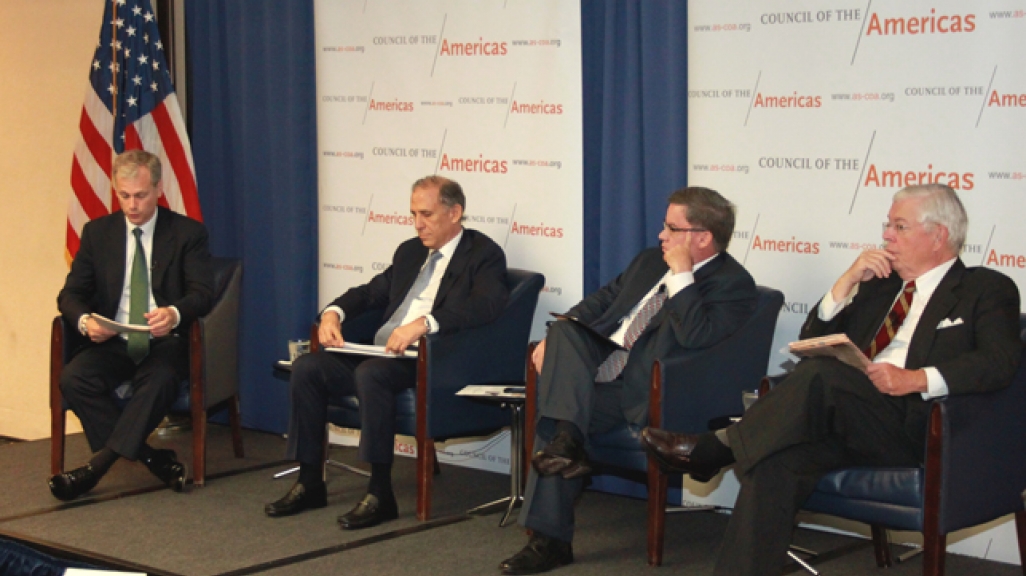Summary: Panel Discussion on Energy, Trade, and Investment in Nicaragua
Summary: Panel Discussion on Energy, Trade, and Investment in Nicaragua
Nicaragua has made strides in boosting exports and growth, though challenges remain.
Speakers:
- Jose Adan Aguerri, President, Superior Council of Private Enterprise of Nicaragua
- General Alvaro Baltodano, Presidential Delegate for Investment Promotion and Trade Facilitation of Nicaragua
- Francisco Xavier Aguirre Sacasa, former Minister of Foreign Affairs of Nicaragua and former ambassador to the United States
- Eric Farnsworth, Vice President, Americas Society/Council of the Americas (moderator)
Summary
On June 25, Council of the Americas hosted a panel discussion on the energy profile and investment climate in Nicaragua. In the decade since the signing of the Dominican Republic-Central America-United States Free Trade Agreement (CAFTA), investment and trade between Central America and the United States has risen rapidly. This is particularly true of Nicaragua, which has since seen progress on economic and security issues. However, the country shares with its neighbors a host of social and political barriers to investment. Speakers from the Nicaraguan private sector and government discussed these victories and challenges.
The Nicaraguan Investment Climate
Nicaragua has made economic and social progress in the last 15 years, panelists said. General Alvaro Baltodano noted the country's trade growth has exceeded that of every other CAFTA country. Former Foreign Affairs Minister and Ambassador Francisco Aguirre Sacasa praised the country's “economic governability,” adding that its overall GDP growth is second only to Panama in Central America.
The Superior Council of Private Investment of Nicaragua's Adan Aguerri noted that the country began development in earnest only when it stopped “paying the price” of political conflict. This development could be enhanced by addressing significant investment barriers and investing in human capital, he said. Plus, the country must improve education, encourage exports, and keep inflation low. However, energy costs and production challenges in Nicaragua make it difficult for the country to competitively export manufactured goods. Sacasa explained that he could see Nicaragua posting 7 or 8 percent growth—rather than 5 percent—with more investment and further development of the tourism sector.
Nicaragua's Clean Energy Focus
When President Daniel Ortega entered office in 2007, the country faced a substantial energy crisis resulting from a lack of easily-exploitable resources. Baltodano explained that after a period of investment in wind and thermal technologies, the nation's energy profile today is impressively clean. Plus, the country is working toward a greener grid with SIEPAC, the recently-signed Central American Electrical Interconnection System. Collaboration with the private sector to find innovative new mechanisms for clean energy continues to be a priority as it can help promote growth, said Baltodano.
Aguerri noted there were few risks for foreign investors in Nicaragua's clean energy future. The country is focusing on well-regulated competition, and investment in renewables would be welcomed and protected. However, the comparatively small size of Nicaragua’s energy market has stifled investment, he added.
Social and Political Issues in Nicaragua
Baltodano said that despite improvements in recent years, security remains among Nicaragua’s biggest priorities and challenges. He addressed the crisis involving large numbers of unaccompanied minors migrating from Central America north to the United States. Migrants are frequently subjected to exploitation and violence at the hands of gangs and drug cartels, and the United States lacks an easy solution for when they arrive. Baltodano asserted that this should be a priority for all countries involved, praising U.S. Vice President Joe Biden's recent visit to meet with Central American leaders on the issue.
Despite this issue, Nicaraguans feel more positive about the future. Baltodano cited a 2013 Gallup poll showing that Nicaragua is the only Central American country where a majority of citizens said things were “heading in the right direction.” Sacasa mentioned another Gallup poll showing that Nicaragua placed fourth worldwide for feelings of happiness. Nicaragua has made major improvements in quality of life, including improved water quality and access, better infrastructure, and wide-ranging electricity and internet access.
But political challenges remain, said Sacasa. The legitimacy of the 2008 and 2011 elections have been called into question by domestic and international monitoring bodies, and the population has little faith in the justice system, a definite deterrent for investors. Plus, Aguerri pointed to a dearth of human capital and quality education as barriers to ideal investment conditions.









